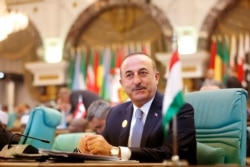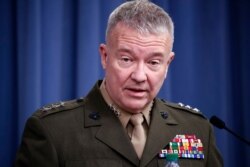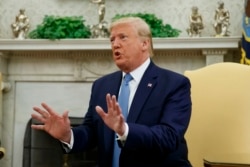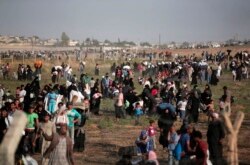Tensions between the United States and Turkey are increasing as Washington's special representative for Syria engagement, Ambassador James Jeffrey, visits Ankara in a bid to iron out differences with its NATO ally. Ankara has threatened military action against Syrian Kurdish militia the YPG, unless the two countries agree on steps to distance the YPG from the Turkish border.
The YPG is a key U.S. ally in the fight against Islamic State terrorists. Ankara, however, links the militia to the Kurdish rebel group, the PKK, which has been fighting a decades-long insurgency against Turkey. Turkish forces are continuing to mass on Syria's border, where the YPG is based.
Turkish Foreign Minister Mevlut Cavusoglu Monday reiterated Ankara's commitment to secure Turkey's border by the creation of a safe zone up to 32 kilometers deep inside Syria.
"If the safe zone is not established and threats toward our country continue, we will launch the operation in the east of the Euphrates," Cavusoglu said.
"The Americans sent Jeffrey and said there were new proposals in the talks that will start today," he added. "We hope an agreement can be reached on this. Concrete steps are needed on this now."
Jeffrey was set to meet high-ranking Turkish diplomats and military officials in two days of talks aimed at averting a military confrontation. On Sunday, U.S. Secretary of State Mike Pompeo spoke with Cavusoglu and reportedly reiterated opposition to any "unilateral" actions in Syria by Turkey.
In a move seen as underscoring Washington's stance, General Kenneth McKenzie, Commander of United States Central Command (CENTCOM), reportedly met Monday with Syrian Democratic Forces (SDF) commander Mazlum Abdi. The YPG is the main component of the SDF, a broad coalition of forces based in the region being threatened by Turkey.
Ankara's ratcheting up of tensions could have another goal. "It can be used as additional pressure on the negotiating table with Washington," said former senior Turkish diplomat Aydin Selcen, who served in Washington and the region.
Turkey's procurement of a Russian S-400 missile system violated the Countering America's Adversaries Through Sanctions Act, or CAATSA. But U.S. President Donald Trump said last week that he is not weighing sanctions against Turkey for purchasing the Russian air defense systems.
The S-400 purchase has already resulted in Turkey's exclusion from buying America's latest F-35 fighter jet. U.S. officials believe Turkey's decision to use the Russian advanced radar technology could compromise the NATO's military systems in the country. The F-35 is NATO's newest stealth fighter jet.
Analysts say Ankara is more concerned by financial and economic penalties under CAATSA, which could hit hard the weakened Turkish economy.Ankara perceives a reluctance by Washington's decision to impose CAATSA, because of the damage it can do to U.S. interests in the region.
"Ankara has a lot of political leverage with the U.S.
"Mr. Trump opted for the lightest reply [banning of F-35s], to buying the S-400's," said Selcen, who now works as a regional analyst.
"...It appears that the U.S. administration is trying to do everything to offer Turkey exemption from these additional sanctions, which could be due to Turkey's geostrategic position," Selcen said.
President Trump is reportedly due to meet U.S. senators Tuesday to discuss measures against Turkey.
Other analysts, however, suggest Ankara's amassing of forces on the Syrian border may not necessarily be just a diplomatic ploy.
"There is a higher possibility of Ankara biting the bullet to enter Syrian Kurdish lands," said analysts Atilla Yesilada of Global Source Partners, "On account of the bitter war against PKK currently being executed in several Turkish provinces and across the border with Iraq."
Turkish forces are currently engaged in one of their most significant operations against the PKK in northern Iraq, the location of the headquarters of the rebels. Analysts point out an attack on their Syrian affiliate would add pressure to the PKK.
Ankara has also said the creation of a safe zone in Syria would allow some of the Syrian refugees in Turkey to return. With around 4 million refugees from Syria, there is growing public discontent in Turkey over their presence. According to a Turkish opinion poll released this month, more than 80% of those polled wanted the Syrians to leave.
Turkish forces have intervened before in Syria, ousting Kurdish rebels from Syria's Afrin province and Al-Bab region; however, in both operations, Turkey's air force had a free hand.
"East of the Euphrates, there is an undeclared sort of no-fly zone enforced by the U.S.," said Selcen. "Unless the U.S. gives the green light, it will be impossible for Turkey to carry out a land operation. It would be suicidal and bring the two NATO allies against each other, which both sides have tried to avoid since the beginning. But that can be the last step."
Despite the risks, some analysts suggest that given the domestic and security pressures facing Ankara, the Turkish military could launch a limited operation into Syria to test Washington's resolve. They say such a move may depend on what new sanctions if any, the U.S. imposes on Ankara over the S-400 purchase.








